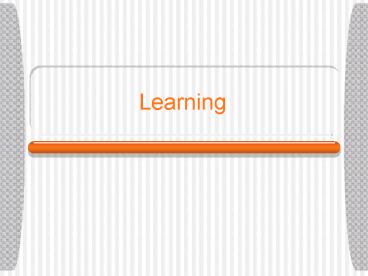Learning PowerPoint PPT Presentation
1 / 24
Title: Learning
1
Learning
2
(No Transcript)
3
Classical conditioning
- Ivan Pavlov (Respondent Behavior)
4
Classical Conditioning
- Unconditioned Stimulus(UCS) Meat
- Unconditioned Response (UCR)Salivation
- Neutral Stimulus Tone
- Conditioned Stimulus (CS) Tone
- When paired with the unconditioned stimulus
- Conditioned response (CR) Salivation to tone
5
Example
6
Example
7
Example
- Father spanks son for swearing.
- Son develops a strong fear of his father. Father
is a(n) _____________? - Conditioned stimulus
8
Classical Conditioning
- Acquisition
- Extinction
- Patient riding elevators to extinguish fear of
elevators
9
Spontaneous recovery
10
Generalization
11
Operant Conditioning
- B.F. Skinner (Operant behavior)
- Associating behavior with its consequences
- E.g. Seals in an aquarium doing a trick to
receive a fish.
12
Reinforcement
- Positive reinforcement
- Give something a person wants
- Increases behavior
- E.g. Mother picking up a crying baby
- (Increases crying because of reinforcement)
- Negative reinforcement
- Remove an unwanted stimulus
- E.g. Sally has a drink after work to relieve
(remove) her anxiety
13
Pos. Neg. Reinforcement
14
Primary Secondary reinforcers
- Primary Innately reinforcing
- Food Sex
- Secondary reinforcers (Conditioned reinforcer)
- Associated with a primary reinforcer
- E.g. Money
15
Immediate Reinforcement
- Sally is more influenced by the current thrill on
having sex, than by the future prospect of
pregnancy or a sexually transmitted disease. - As opposed to delayed reinforcement
- A Paycheck at the end of the month.
16
Reinforcement schedules
- Continuous
- Every time
- Partial (Intermittent)
- Fixed ratio
- 15 for every 3 pages you write
- Fixed Interval
- 15 for every hour you work
- Variable ratio
- 15 after varying of pages
- (You do not know how many pages you will need to
do before you get paid again) - Variable interval
- 15 given at various times during the day
17
Reinforcement Schedules
18
Punishment
- Positive punishment
- Get something you dont want ( a spanking)
- Negative punishment
- What you do want is taken away ( Television
time) - Problem with punishment
- Creates anger, fear, resistance
- Less effective than positive reinforcers to
promote desirable behavior.
19
Punishment
20
Shaping
- Cookies to reinforce quiet play
- MM therapy
21
Motivation
- Internal (intrinsic) Motivation
- Hobby - You like doing it
- External (outside) motivation
- Job - You get money for doing it
22
Cognitive process
- Behavior is not automatically produced by a
reward. - We think about it, and ask
- How much of the reward do I get?
- What are the chances of getting the reward?
- Is the reward worth it?
23
Observational Learning
- Albert Bandura
- E.g. Child turning the key to start the car
- (without explicit training)
- Matt using the ATM machine after watching Dad
- Modeling
24
(No Transcript)

